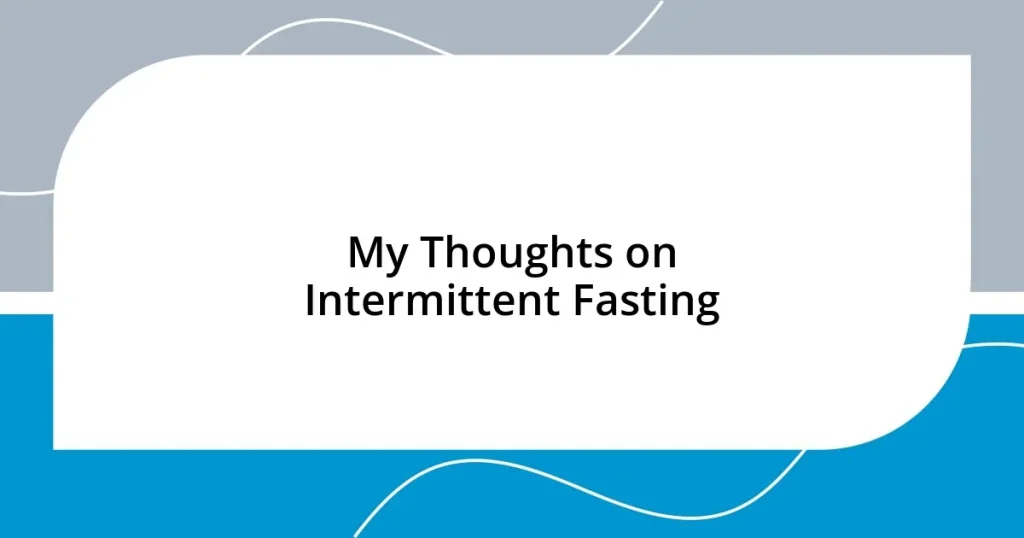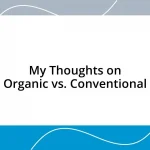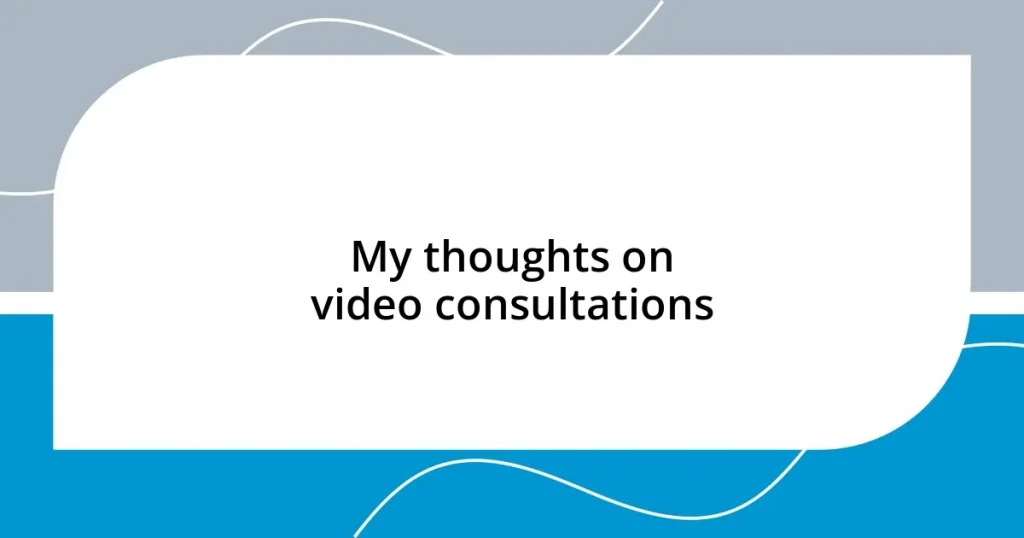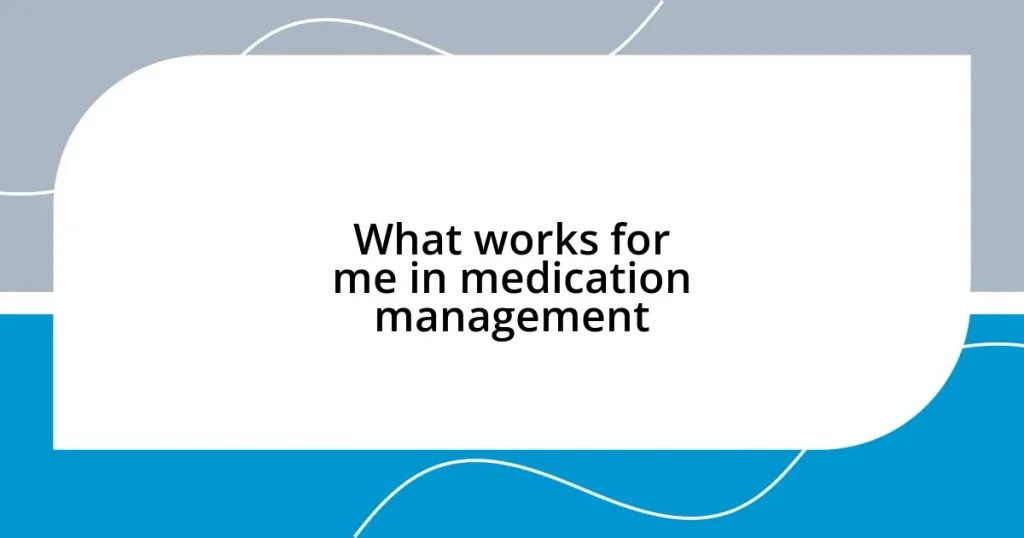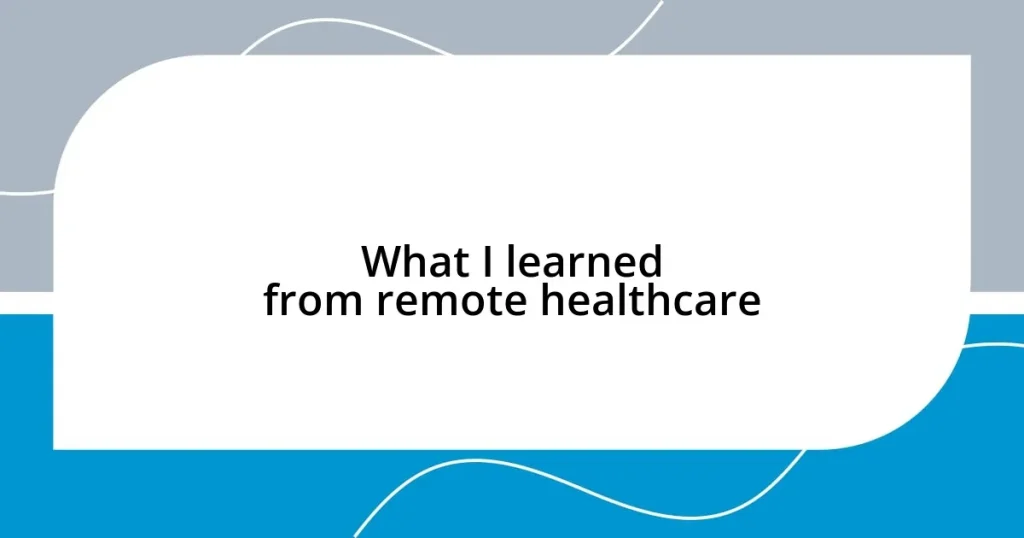Key takeaways:
- Intermittent fasting is more about restructuring eating habits than strict dieting, promoting mindfulness and control over food choices.
- Key benefits include improved energy levels, weight management, enhanced brain function, and emotional well-being.
- Different methods like 16:8, 5:2, alternate-day, and the Warrior Diet offer flexible approaches to fasting, allowing individuals to find what suits them best.
- Success in intermittent fasting relies on preparation, listening to one’s body, and balancing indulgence with nutritious choices.
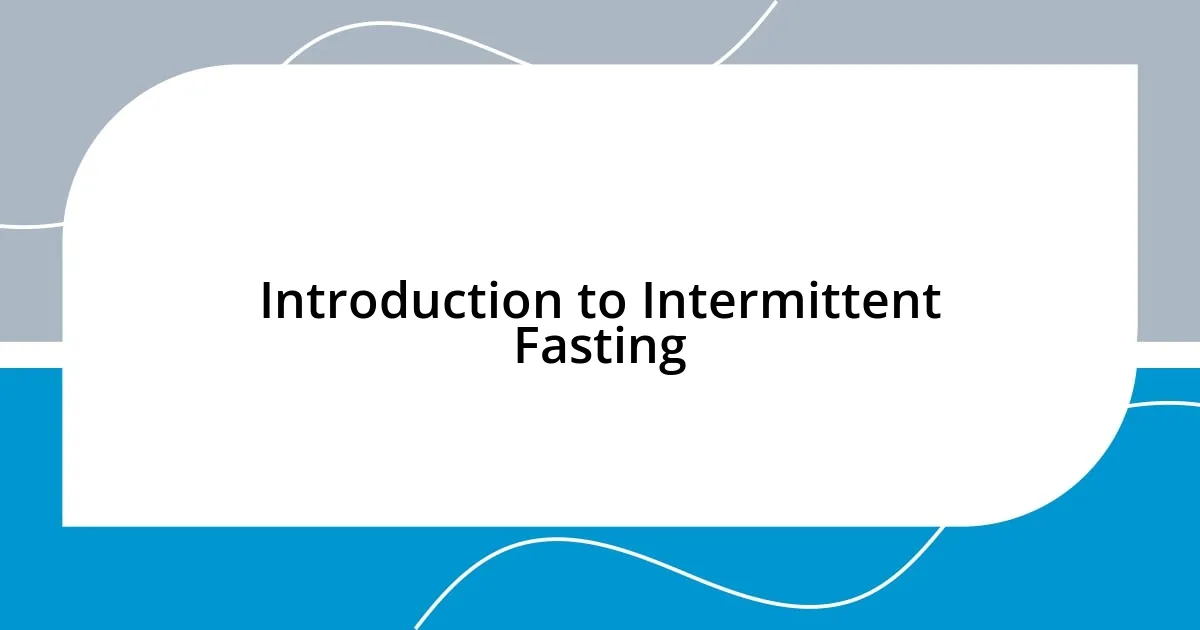
Introduction to Intermittent Fasting
Intermittent fasting has captured many people’s attention, including mine, as a unique approach to eating that focuses on when to eat rather than what to eat. I remember the first time I tried it – I was skeptical yet curious, wondering if I could really delay my meals and still feel energized. It felt liberating to shift my perspective from strict dieting to a more flexible eating schedule.
From my experience, this method isn’t about deprivation; it’s more about giving our bodies time to rest and digest. The idea of having a specific fasting window felt like a challenge at first, but I quickly realized it encouraged more mindful eating. Have you ever felt that midday slump after a heavy lunch? That’s the kind of fatigue I aimed to combat when experimenting with different fasting periods.
As I explored various intermittent fasting patterns, such as the 16:8 method where one fasts for 16 hours and eats during an 8-hour window, I found a rhythm that worked for me. The emotional aspect of intermittent fasting was surprising – I felt a sense of control over my eating habits that I hadn’t experienced before. Isn’t it fascinating how a simple change in our eating schedule can lead to such profound effects on our overall well-being?
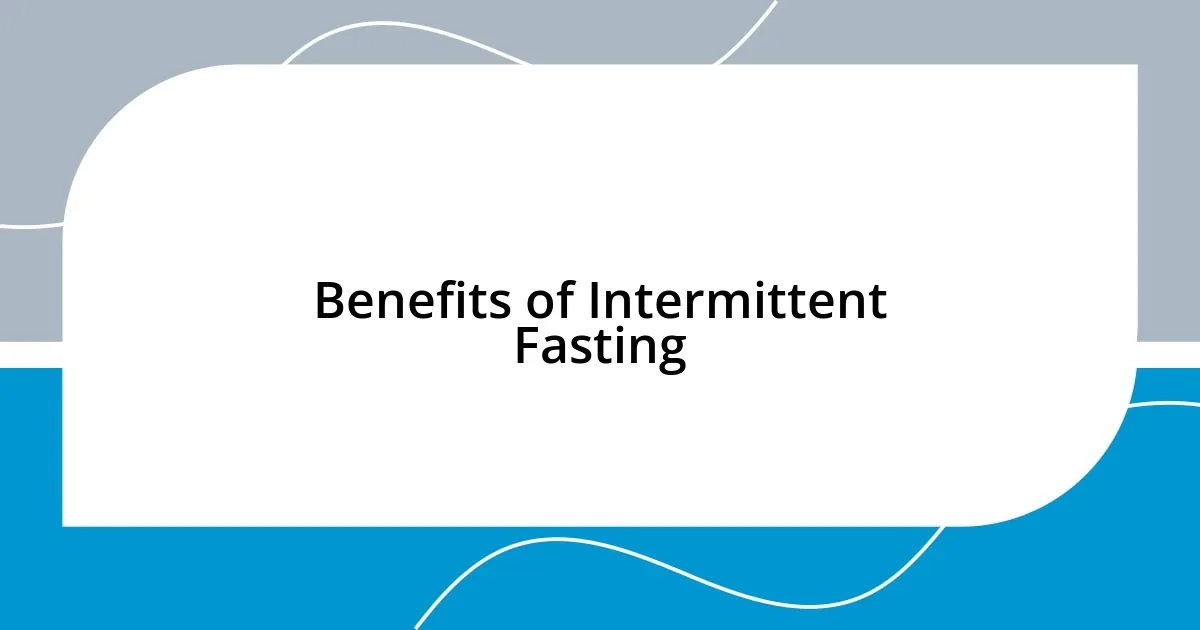
Benefits of Intermittent Fasting
Intermittent fasting brings a wealth of benefits that can significantly impact both physical and mental well-being. One of the most noticeable changes I experienced was increased energy levels. After adjusting to my fasting schedule, I felt more alert and focused throughout the day. I remember one afternoon when I typically would have crashed post-lunch. Instead, I powered through my tasks with enhanced clarity. This newfound energy can be linked to the body’s ability to tap into its fat stores for fuel, promoting overall metabolic health.
The benefits don’t stop there. Here’s a closer look at the positive impacts intermittent fasting can offer:
- Weight Management: By reducing the eating window, many find it easier to control calorie intake.
- Improved Insulin Sensitivity: This can help regulate blood sugar levels, vital for overall health.
- Cellular Repair: Fasting triggers autophagy, a process where cells remove damaged components, which can promote longevity.
- Enhanced Brain Function: Some studies suggest that intermittent fasting may boost brain-derived neurotrophic factor (BDNF), which is linked to improved cognitive function.
- Emotional Well-being: I noticed a reduction in stress around meal times. Fewer decisions about what to eat allowed me to focus on more important aspects of my day, leading to a calmer mindset.
Embracing this approach has not only shaped my relationship with food but also strengthened my mental resilience.
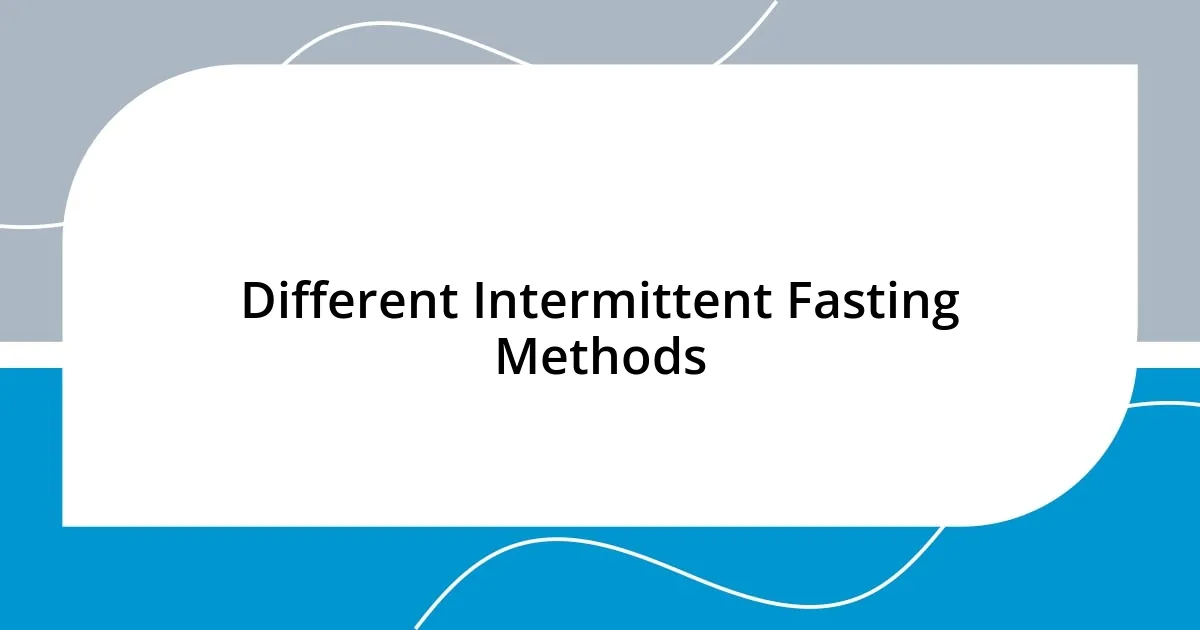
Different Intermittent Fasting Methods
Exploring different intermittent fasting methods has been quite enlightening for me. One of the most popular is the 5:2 method, which involves eating normally for five days and restricting calories (around 500-600) for two non-consecutive days. I remember trying this method initially; it felt less restrictive since I could enjoy my meals most of the week. On fasting days, it became a fun challenge to see how satisfying I could make my limited calories, which added an element of creativity to meal prep.
Another approach that intrigued me was alternate-day fasting, where you alternate between days of eating and fasting. The first time I attempted this, I learned a lot about my hunger cues. Initially, I felt a bit lost trying to adapt to the drastic fluctuation, but it also highlighted my emotional relationship with food. It amazed me how much I relied on food for comfort. I became more conscious of my eating habits as I navigated the challenges of fasting days versus feasting days.
Finally, the Warrior Diet stands out for its unique structure, where you fast for 20 hours and eat a large meal in a 4-hour window. I found it fascinating how this method felt almost primal. The sense of anticipation throughout the day made my one meal feel indulgent, almost like a celebration. It challenged my usual eating rhythm, forcing me to appreciate the flavors and quality of the foods I consumed. The emotional satisfaction of a great meal after fasting was a rewarding experience I hadn’t anticipated.
| Fasting Method | Description |
|---|---|
| 16:8 | Fast for 16 hours, eat during 8-hour window. |
| 5:2 | Eat normally for 5 days, restrict calories for 2 non-consecutive days. |
| Alternate-Day | Alternate between days of eating and fasting. |
| Warrior Diet | Fast for 20 hours, eat one large meal in a 4-hour window. |
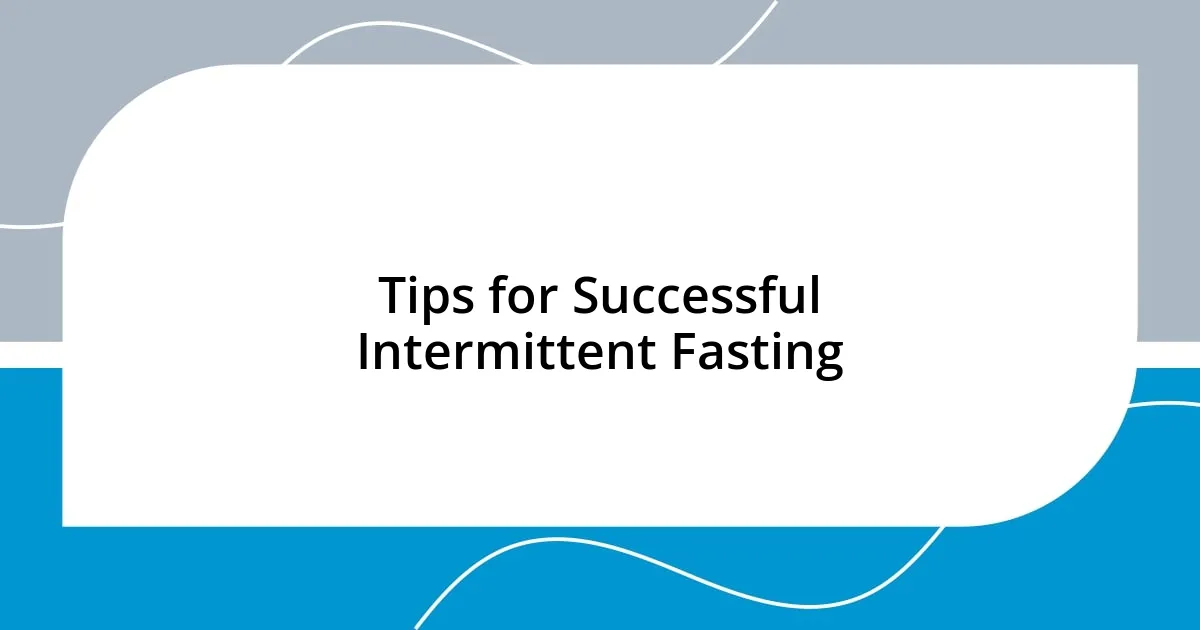
Tips for Successful Intermittent Fasting
Adhering to a consistent fasting schedule is crucial for success. Personally, I found that setting specific times for my eating window helped me establish a routine. This structure made it easier to manage my hunger and make better choices, rather than grabbing whatever was available in a panic. Have you ever noticed how a routine can alleviate stress? I think that’s what works wonderfully here.
Staying hydrated is another key aspect that I learned to embrace. For me, drinking water during fasting hours became a ritual. Not only did it keep my hunger at bay, but it also helped me feel more energized. I would even infuse my water with slices of cucumber or lemon for a refreshing twist. Keeping a water bottle nearby was a game-changer—have you tried it?
Lastly, listening to your body is vital. There were times when my energy dipped, and I realized I needed to adjust my fasting window. I’ve learned not to be too hard on myself; after all, intermittent fasting is about finding a balance that fits your lifestyle. Each person’s experience is unique, so it encourages me to be flexible. What about you? Are you ready to tune in to what your body is telling you?
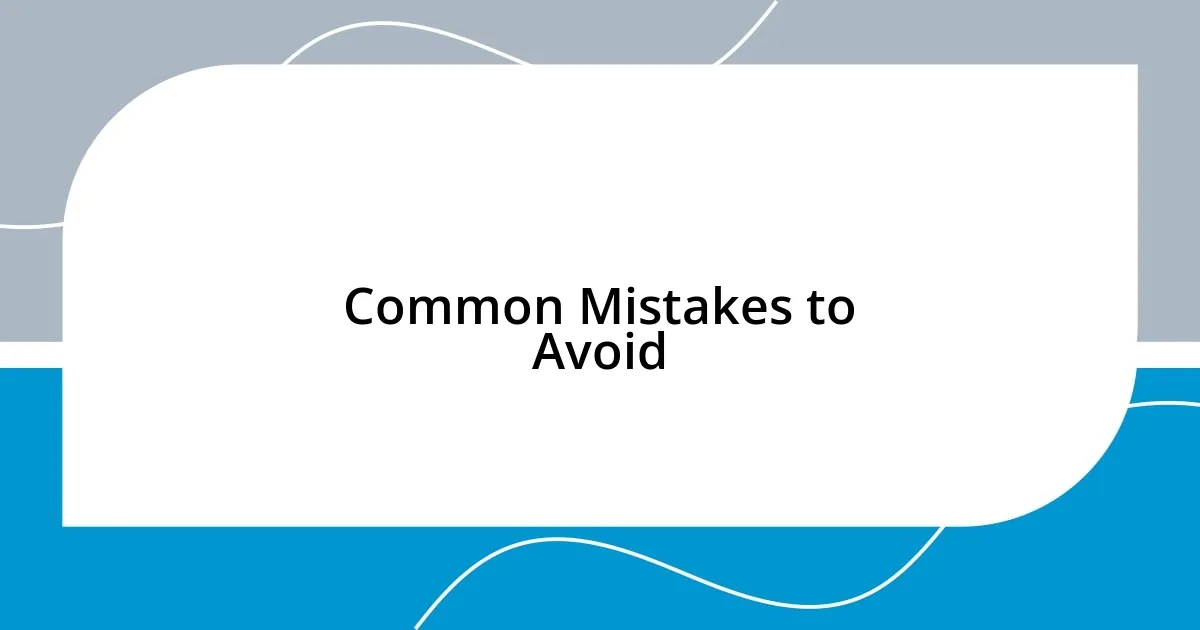
Common Mistakes to Avoid
One common mistake I’ve seen is jumping into extended fasting without preparation. When I first attempted a 24-hour fast, I was so eager that I neglected to hydrate properly beforehand. By midday, I felt dizzy and unfocused, which made me question if I could even continue. I soon learned that easing into longer fasts with shorter ones can help your body adjust more gradually. Have you ever underestimated the importance of preparation?
Another pitfall is overindulging during eating windows. In my early days, I’d often think, “I’m fasting, so I can eat whatever I want!” This mindset led to excessive meals that left me feeling sluggish and counterproductive to my goals. I realized that balancing indulgence with healthful choices is key. I started to focus on nutrient-dense foods that not only satisfied my hunger but also fueled my body effectively. What about you? Have you found the sweet spot between enjoyment and nourishment?
Lastly, neglecting to listen to your body’s signals can be detrimental. I remember an afternoon where I pushed through a fasting day despite feeling exhausted. Ignoring that fatigue was a lesson I learned the hard way because it made me more likely to binge later. I’ve since found that being mindful of my body’s needs has helped me maintain a healthier relationship with food. How do you tune into your body’s rhythms during fasting?
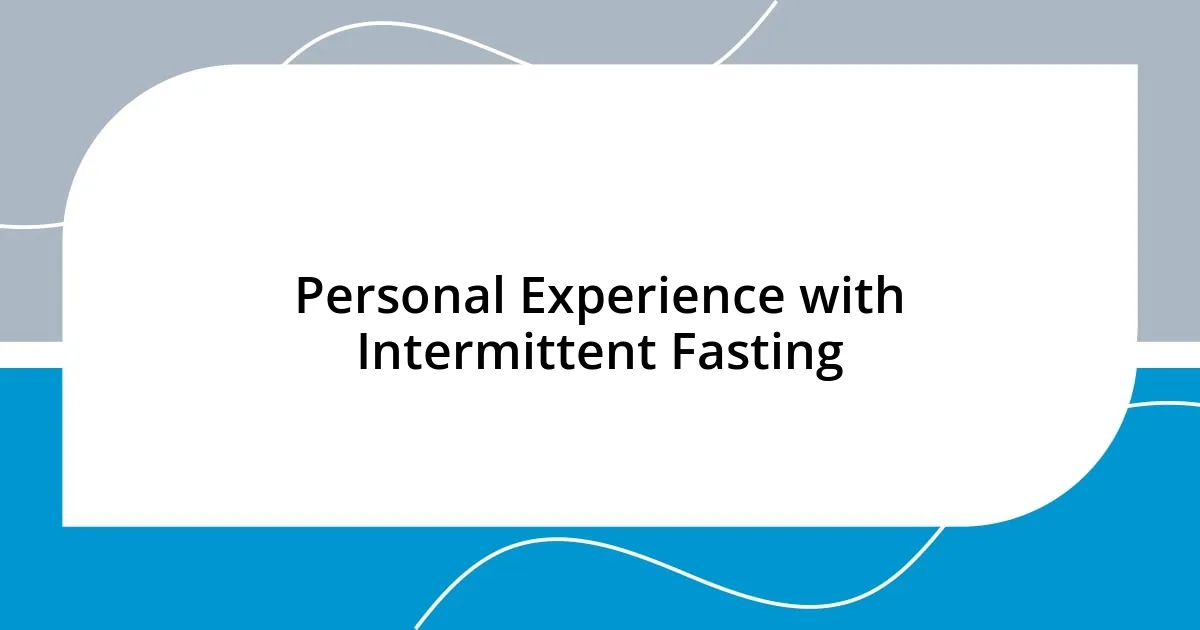
Personal Experience with Intermittent Fasting
My journey with intermittent fasting truly began with a sense of curiosity. I remember the first week I tried it; I experienced a mix of excitement and anxiety. The initial days felt challenging, as my stomach grumbled like a disgruntled child, demanding attention. I questioned my decision more than once—but I wanted to see if it could reshape my habits. Have you ever pushed through discomfort for the sake of exploration? Those moments quickly became eye-opening.
As I delved deeper, I discovered the surprisingly liberating aspect of fasting—that I didn’t have to obsess over food. I distinctly recall a weekend when I was out with friends. Instead of fixating on what to eat, I felt present in the conversation. The laughter and connection stood out more than any dish could offer. Did you know that sometimes, simply being in the moment brings more satisfaction than a hefty meal can? This realization transformed my perspective on food and its role in my social life.
Reflecting on my emotional connection to food, I noticed that fasting also nudged me towards mindfulness. There were days when I broke my fast with fresh fruit, savoring each bite rather than munching mindlessly. I felt more in tune with my senses, almost as if each flavor was amplified. I learned that appreciating what I eat is just as important as what I eat. Have you experienced that sense of heightened awareness in your food choices? Embracing this has made intermittent fasting not just a diet, but a journey to understanding my relationship with food.
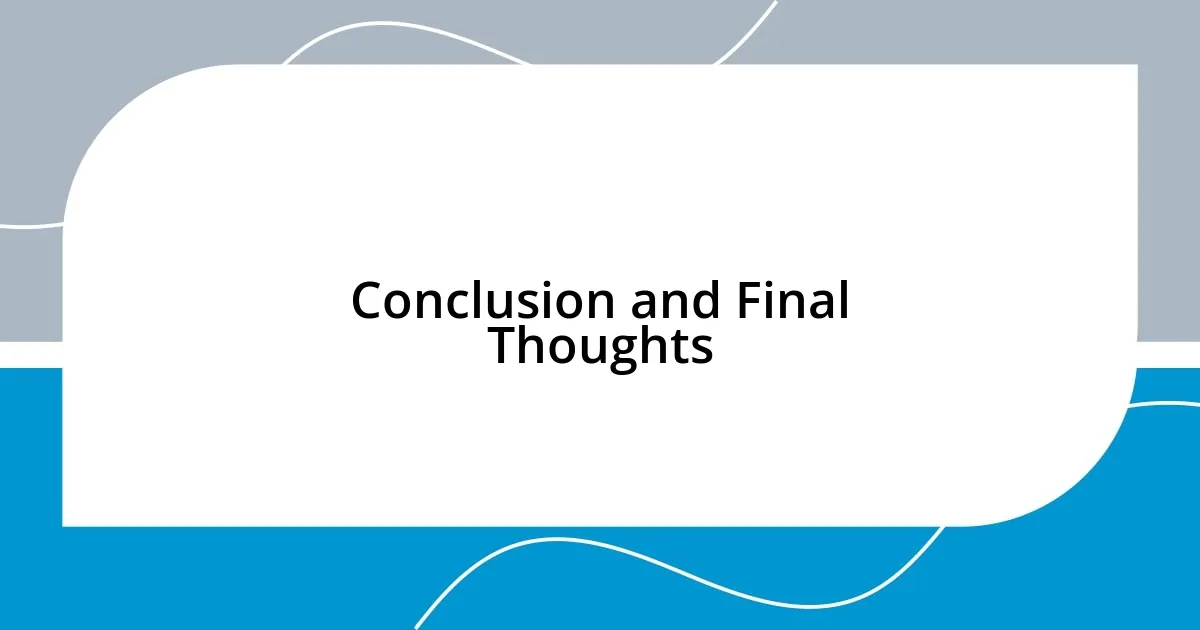
Conclusion and Final Thoughts
In my experience, intermittent fasting is more than just a dietary regimen; it’s a transformative approach to life. I recall the moment I realized that it wasn’t solely about when I could eat, but rather how it reshaped my relationship with hunger and satisfaction. Have you ever noticed how fasting can shift your mindset about food? It certainly did for me, fostering a newfound appreciation for each meal.
As I reflect on my journey, I can’t help but emphasize the importance of flexibility. There were times when I adhered strictly to my fasting schedule, only to find I was more stressed than satisfied. Learning to adapt was crucial. Have you found that flexibility can enhance your experience with food? Embracing the ebb and flow of my fasting journey has made it feel less like a chore and more like a personal choice.
Ultimately, intermittent fasting has empowered me to become more in tune with my body. The moments when I chose to stop and listen to what my body was telling me—like when it craved a hefty meal or when it needed a light snack—were truly enlightening. This inner dialogue transformed my eating habits from a mindless routine to a thoughtful practice. Have you experienced that empowering feeling of connecting with your body’s needs? It’s these moments of introspection that have made all the difference in my journey.











